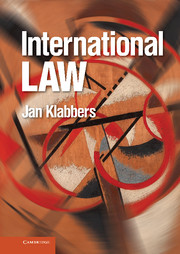Book contents
- Frontmatter
- Contents
- Detailed table of contents
- Table of cases
- Preface
- List of abbreviations
- Part I The structure of international law
- 1 The setting of international law
- 2 The making of international law
- 3 The law of treaties
- 4 The subjects of international law
- 5 Jurisdiction, powers and immunities
- 6 The individual in international law
- 7 The law of responsibility
- 8 International courts and tribunals
- 9 Sanctions, countermeasures and collective security
- Part II The substance of international law
- Part III The surroundings of international law
- Bibliography
- Index
- References
4 - The subjects of international law
from Part I - The structure of international law
- Frontmatter
- Contents
- Detailed table of contents
- Table of cases
- Preface
- List of abbreviations
- Part I The structure of international law
- 1 The setting of international law
- 2 The making of international law
- 3 The law of treaties
- 4 The subjects of international law
- 5 Jurisdiction, powers and immunities
- 6 The individual in international law
- 7 The law of responsibility
- 8 International courts and tribunals
- 9 Sanctions, countermeasures and collective security
- Part II The substance of international law
- Part III The surroundings of international law
- Bibliography
- Index
- References
Summary
INTRODUCTION
The laws of China, as commonly understood, apply to all persons and legal entities in China; it is often said that these form the subjects of Chinese law. By the same token, the question arises of to whom, or to which entities, international law applies. What, in other words, are the subjects of international law? This is a topic of great controversy, partly because of the relevance of subjects doctrine. Rights and obligations must apply to someone; hence, it is through subjects doctrine that these rights and obligations under international law are allocated.
The main subjects of international law are states, and for centuries states were held to be the only subjects of international law, save perhaps for a few oddities (the Holy See, the Maltese Order) which would be considered subjects for historic reasons and, it seems, because states generally treated them as subjects. This focus on states still applies, and makes for difficult discussions on the legal standing of other entities. It is now generally recognized that entities such as intergovernmental organizations (the UN, the EU, the IMF or the WTO) are to be regarded as subjects of international law – and this was ultimately confirmed by the ICJ in the 1949 Reparation opinion, holding that the UN had to be considered as such. Yet, this was not always the case; early observers were at pains to come to terms with the status of the League of Nations, with some treating the League as an oddity similar to the Holy See.
- Type
- Chapter
- Information
- International Law , pp. 67 - 90Publisher: Cambridge University PressPrint publication year: 2013

